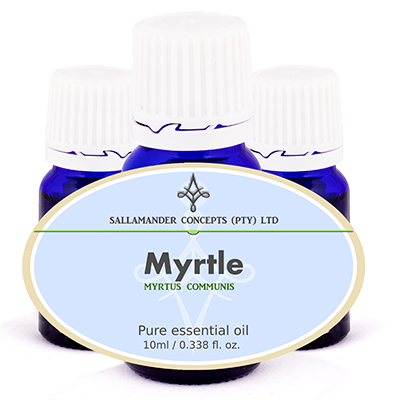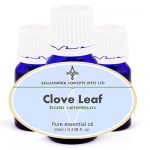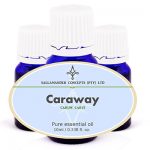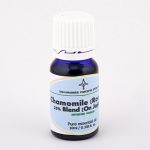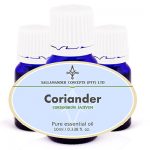Information on Myrtle essential oil
Myrtle essential oil is extracted from Myrtus communis of the Myrtaceae family and is also known as “Corsican pepper”.
The mild and gentle Myrtle essential oil has an uplifting effect on the body and mind and is helpful when used in cases of addiction and self-destructive behavior – it is said to cleanse the inner being and dissolve disharmony.
It has an excellent healing effect on acne prone skin as it is bactericidal and antiseptic.
These properties have made it an ancient popular remedy for chronic bronchial cattarh.
The gentle nature of Myrtle essential oil makes it very effective when used to treat coughs and other chest complaints in children and the elderly.
The uplifting and harmonising effect is also useful as a sleep aid
Oil Properties
Myrtle Essential Oil has a clean camphoraceous smell, similar to eucalyptus and usually has a pale yellow to orange colour.
Origin
Myrtle comes from the same family as eucalyptus, tea tree, bayberry and English bog myrtle.
Myrtle is a small tree or large bush with lots of small, tough branches, small sharply pointed leaves and flowers followed by small, black berries.
The leaves and flowers have a prominent fragrance.
Myrtle has been used in herbal medicine since ancient Egyptian times, as there are records showing the leaves being steeped in wine to combat fever and infection.
The plant was dedicated to Aphrodite in Ancient Greece and Dioscorides prescribed macerated Myrtle wine to patients suffering from lung and bladder infections, as well as for tuberculosis.
Dr Delious de Savgnac (1876) recommended Myrtle for the treatment of haemorrhoids, pulmonary infections, genital infections and problems with the bladder and urinary system
Extraction
Myrtle Oil is extracted from the leaves and twigs of Myrtus communis by steam distillation.
Chemical composition
Some of the main chemical components are α-Pinene, 1,8 Cineole, Myrtenyl acetate, (+)-Limonene, Linalool, α-Terpinal acetate, α-Terpineol, Geranyl acetate, Linalyl acetate
Therapeutic properties
The therapeutic properties of myrtle essential oil are anticatarrhal, antiseptic, astringent, bactericidal, expectorant and balsamic.
Precautions
Myrtle essential oil contains small amounts of Estragole and Methyleugenol and caution is advised as these are both potentially carcinogenic, even though Myrtle oil (the whole oil) has demonstrated weak antimutagenic activity.
Myrtle essential oil is also known to influence medication used for diabetes when it is ingested.
The amount of myrtle oil that can be used topically is influenced by the amount of Estragole and Methyl eugenol found in the essential oil. IFRA suggests a maximum dilution rate of Myrtle oil as 0.04% – this extreme limit is based on a high content of Estragole and Methyleugenol.
To err with regard to safety, and if a GC-MS report for the batch of oil is not available, we advise use of the IFRA dilution rate of 0.04% for topical use.
As with most essential oils, this essential oil should be kept in a dark and cool place and should be stored in an airtight glass bottle (Preferably in the fridge at a temperature of around 4° Celsius / 39° Fahrenheit).
Please read our page with heading: Safety with Essential Oils before using this oil.
We recommend the following book as an excellent resource regarding safety:
Essential Oil Safety: A Guide for Health Care Professionals by Robert Tisserand & Rodney Young (#ad).
Uses
Myrtle oil is primarily used for chronic pulmonary conditions, to expel phlegm and cattarh from the lungs.
It is useful for acne prone skin and also as a sleeping aid, to uplift, refresh and restore.
Myrtle oil is said to be of great benefit in helping people to cope with withdrawal from addiction and also to soothe and ease self destructive behavior.
Burners and vaporizers
In vapor therapy, Myrtle Essential Oil can be helpful with combating symptoms of addiction withdrawal and feelings of anger, greed, envy and fear. Using Myrtle essential oil in vapor therapy is also useful for the removal of bronchial cattarh and for other lung infections.
Blended Massage Oil and in the Bath
As a blended massage oil or diluted in the bath, Myrtle essential oil will assist with physical exhaustion, insomnia, depression, anxiety, nervous tension and stress, while having a calming and uplifting effect, reducing the effects of addiction withdrawal and will help to combat infection and open the lungs.
Blended in Cream
In a cream or lotion it is used to balance the production of sebum in the skin and thereby correcting and balancing overly-dry as well as overly-oily skin.
The astringent, deodorizing and non-sensitizing effects of Myrtle essential oil are most effective when used on acne and oily, infected skin.
Compress
Myrtle oil has an astringent effect on piles, if used in a diluted form together with cypress essential oil and witch hazel hydrosol.
Suggested Dilution Rates
On the skin
Adult:
Face: Maximum of 0.04%
Body: Maximum of 0.04%
Bath: Maximum of 0.04%
3 to 24 months:
Do not use topically – Avoid use
2 to 11 years:
Do not use topically – Avoid Use
12 to 15 years
Face: Maximum of 0.04%
Body: Maximum of 0.04%
Bath: Maximum of 0.04%
Pregnancy
Do not use this essential oil topically – avoid use
- When in doubt consult your doctor / medical professional before use.
- Most professionals and/or Aromatherapists will always err on the side of safety when giving advice regarding the use of essential oils and oleo resins during pregnancy.
- Quite a number of Aromatherapists advise that you should avoid all essential oils completely while pregnant, specifically during the first trimester. This is a very safe approach but may not be necessary at all.
Diffusers and Vaporisers
4 to 8 drops
General:
- When using for the first time – Always use the lowest dilution rate and build up slowly to the maximum. Stop using all essential oils on the skin if irritation or allergy occurs.
- Any advice or instruction received from a medical professional ALWAYS supersedes recommendations or advice found on this website. When in doubt consult your doctor / medical professional.
Summary
Myrtle oil has an uplifting effect on the body and mind and is helpful when used in cases of addiction and self-destructive behavior – it is said to cleanse the inner being and dissolve disharmony.
It has an excellent healing effect on acne prone skin as it is bactericidal and antiseptic. These properties have made it an ancient popular remedy for chronic bronchial cattarh.
The uplifting and harmonizing effect is also useful as a sleep aid.
The dilution rate of Myrtle essential oil for topical use can be increased if certainty is gained regarding the percentages of estragole and methyleugenol in the specific batch of the oil being used. It would seem that the essential oil would need to be tested by a laboratory and an expert before the topical (dermal) limit be raised.
Blends
Although most essential oils blend well together, myrtle oil blends particularly well with Bergamot, clary sage, clove, hyssop, eucalyptus, ginger, lavender, peppermint, rosemary, spearmint, thyme and tea tree essential oils.

